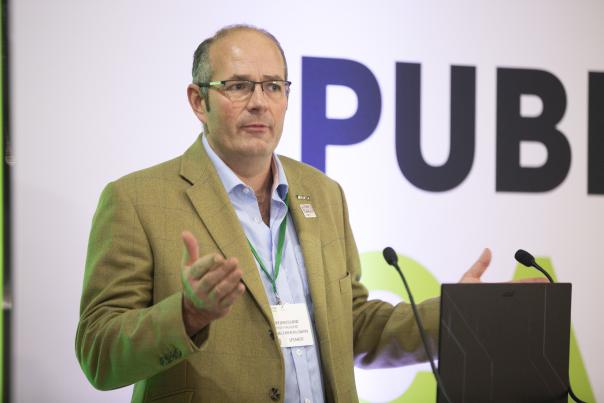
Deputy President of the NFU Tom Bradshaw told an invited audience of public sector caterers that the farming organisation understands very well the budget restrictions faced by many caterers.
He said: “This issue needs us all to work with the Government to help you buy more British produce, but it will only work if there is the political will needed. Too often the advantages of long-term value lose out to short-term cost and cheap imports, and when it does we are in danger of seeing a drop in UK production.
“There’s more to sustainability than the ‘price on the day’. We will lose our ability to produce food sustainably in the long-term in the UK if we contract it out to water-scarce areas such as southern Spain and north Africa.
“UK farmers need to be able to invest, we can’t produce food cheaper to our strong welfare and environmental standards, so we need to address the issue of tight budgets if we want more British ingredients on public sector menus.”
He also made the point that in the short-term what might help a little is for caterers to be prepared to use cheaper cuts of meat. “Brown chicken meat [thighs] is fine for things like pies, if anything tastier, and is cheaper than breast.”
The webinar also heard from dairy and beef farmer Helen Dent from Penrith in Cumbria, who made the point that not everywhere in the UK was right for growing crops.
She added: “Where we are, the rainfall helps grow good pasture which is ideal for dairy and beef cattle that can be raised very sustainably. We feed them on home-grown forage and are phasing out soya as a feed because lots of imported soya is not grown sustainably.”
As well as being a farmer she worked as a sustainability consultant, and emphasised that this meant not simply obsessing about carbon emissions but looking equally at issues such as diversity.
On her own farm they were looking not only at helping soils store more carbon, but at slurry storage. Although the latter needs large-scale investment, cooling slurry in storage can reduce ammonia emissions by up to 75%, and the heat extracted can be used for other purposes such as heating water or livestock housing.
Other actions on her farm included an extensive hedgerow planting programme that not only helped encourage more diverse local fauna and flora but created cool spots to help the cattle stay more comfortable in summer heat.
The other speaker at the webinar was Sarah Stanner, the science director at the British Nutrition Foundation, who explained that a healthy diet was more than just nutrition, it took in environmental, economic and socio-cultural impacts too.
She commented: “In children’s diets today there is lots of saturated fat and sugar but not enough fibre, oily fish, fruit and veg. There is more than one reason why, but it’s significant that a low-income family today would have to spend 50% of their income on groceries to achieve the dietary goals in the Eatwell Guide.”